Probate fees in Ontario, also officially known as Estate Administration Tax (EAT), are mandatory costs paid to the Ontario government when a probate application for an appointment of an estate trustee is filed with the court. These fees are calculated based on the total value of the estate to be probated. Use our updated for 2025 Ontario probate fees calculator to estimate your official probate costs accurately.
In Ontario, probate fees are
Note: Probate fees are paid from the assets of the deceased’s estate, not by the executors, personal representatives, or beneficiaries. The executor of the estate typically uses assets from the estate, such as bank accounts, to pay EAT before distributing the remaining assets to the beneficiaries. There is no inheritance tax in Canada, so you do not pay tax on the money you inherit.
| Estate Value | Probate Fee (Estate Administration Tax) |
|---|---|
| $0 – $50,000 | $0 – No probate fee payable |
| Amount over $50,000 | $15 per $1,000 (1.5%) on the value exceeding $50,000 |
Example calculation: For an estate valued at $500,000:
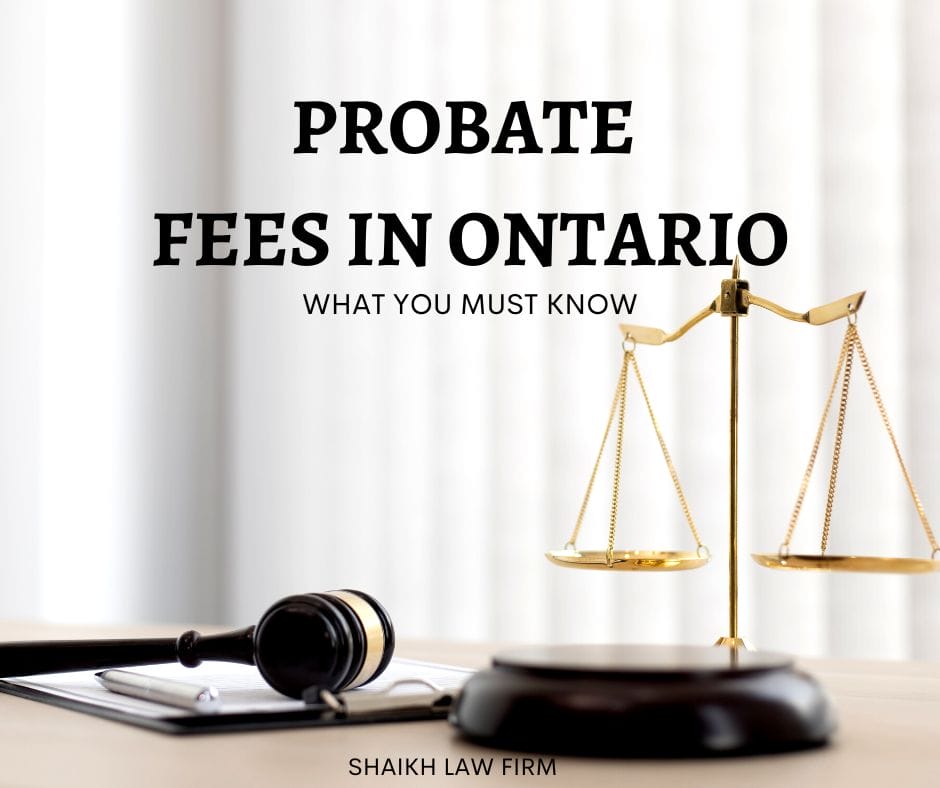
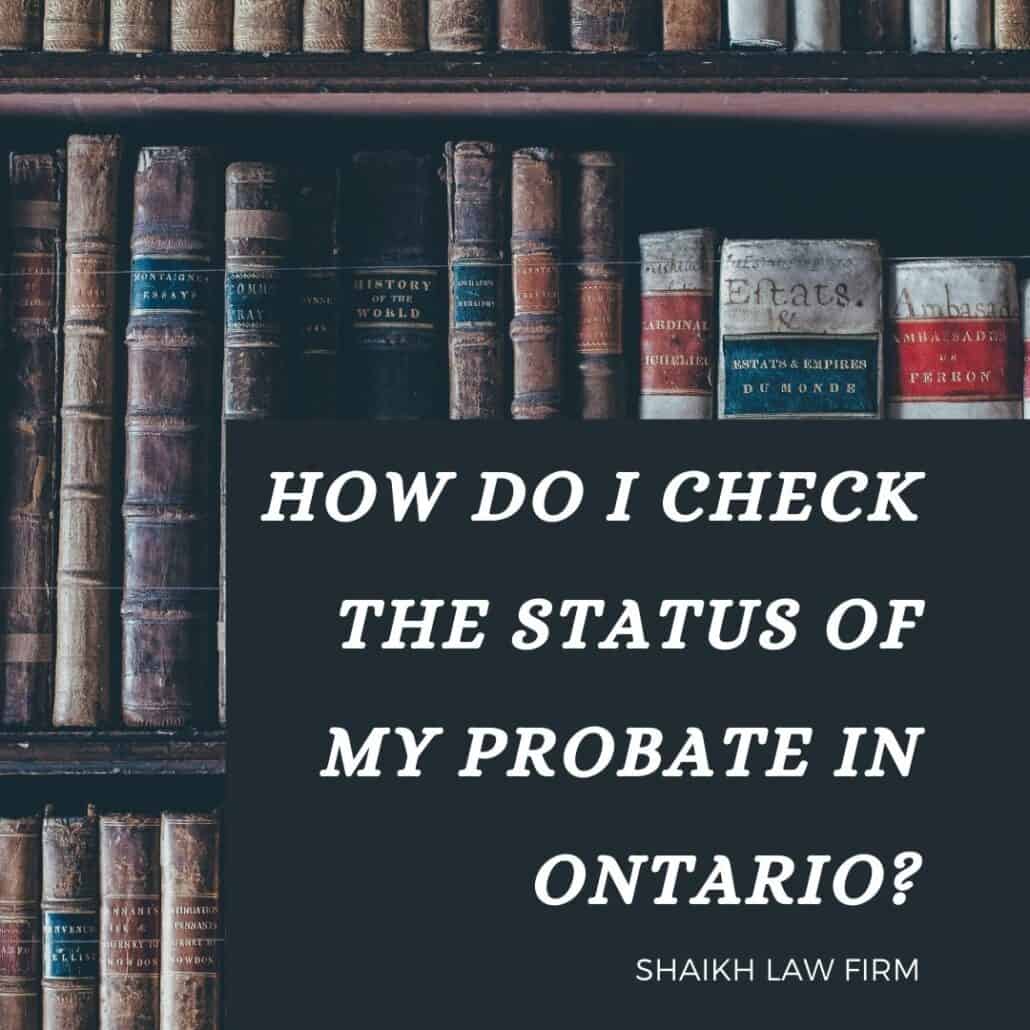
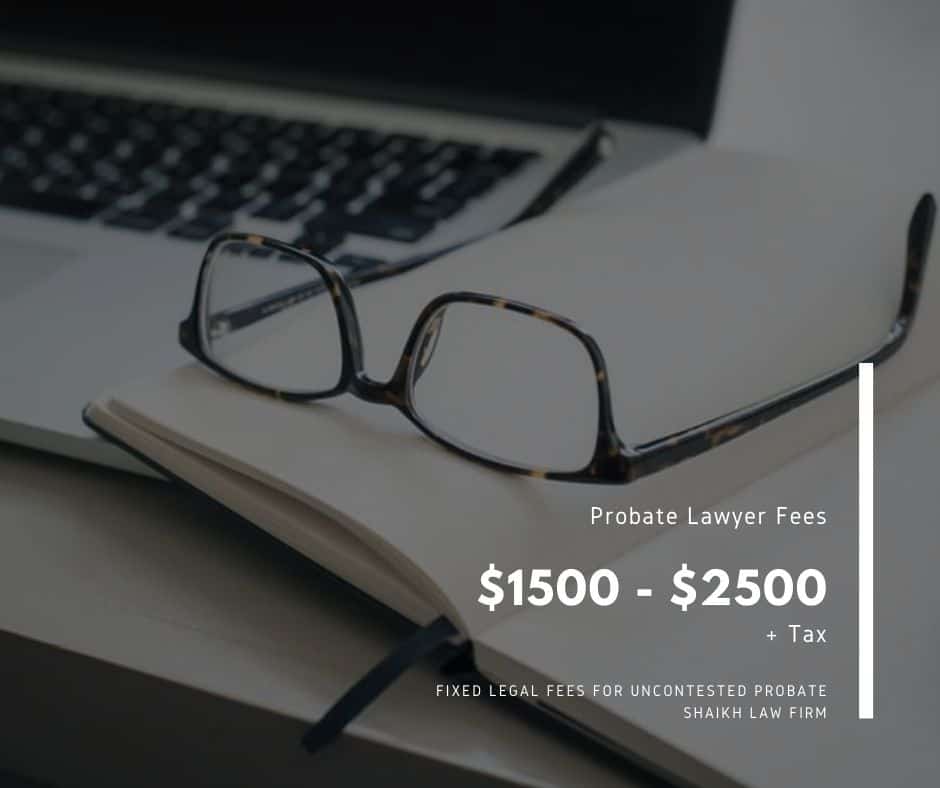
No. A short answer is you do not need a lawyer to file for a probate application. There is no legal requirement to hire a lawyer to file a probate application in Ontario.
However, it is essential to understand that a probate lawyer would be qualified to draft the probate application as per Ontario’s civil procedure rules. The Chances of rejection of a probate application would be less if you were to retain an estate & probate lawyer who is more experienced in drafting such applications. Your lawyer will be responsible for attending to any court objections and resolving such complaints to the judge’s satisfaction.
A probate lawyer can advise on how to file a probate application in a tax-efficient way and guide you to take steps to protect your assets and what other measures are needed other than probate application.
A probate lawyer will be your go-to person if you run into a problem when distributing the assets.
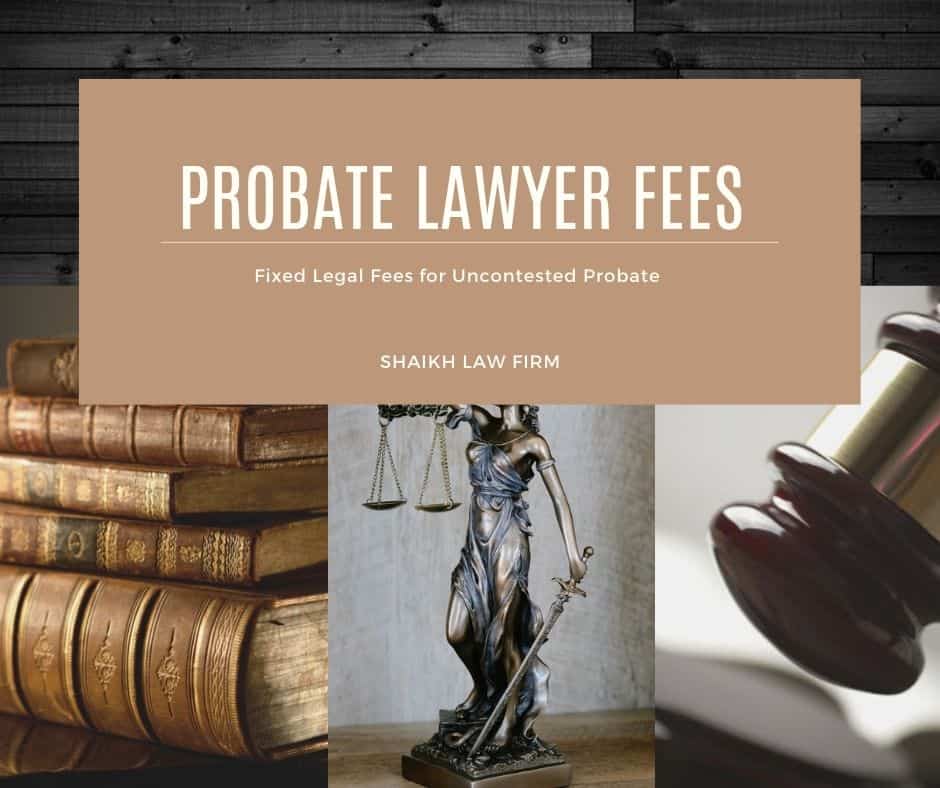
Probate in Ontario Costs range from $1500 to $2500 + HST in legal fees, plus applicable Estate Administration Tax, calculated at $0 for every asset up to $50,000 and $15 for every $1,000 of assets over $50,000.
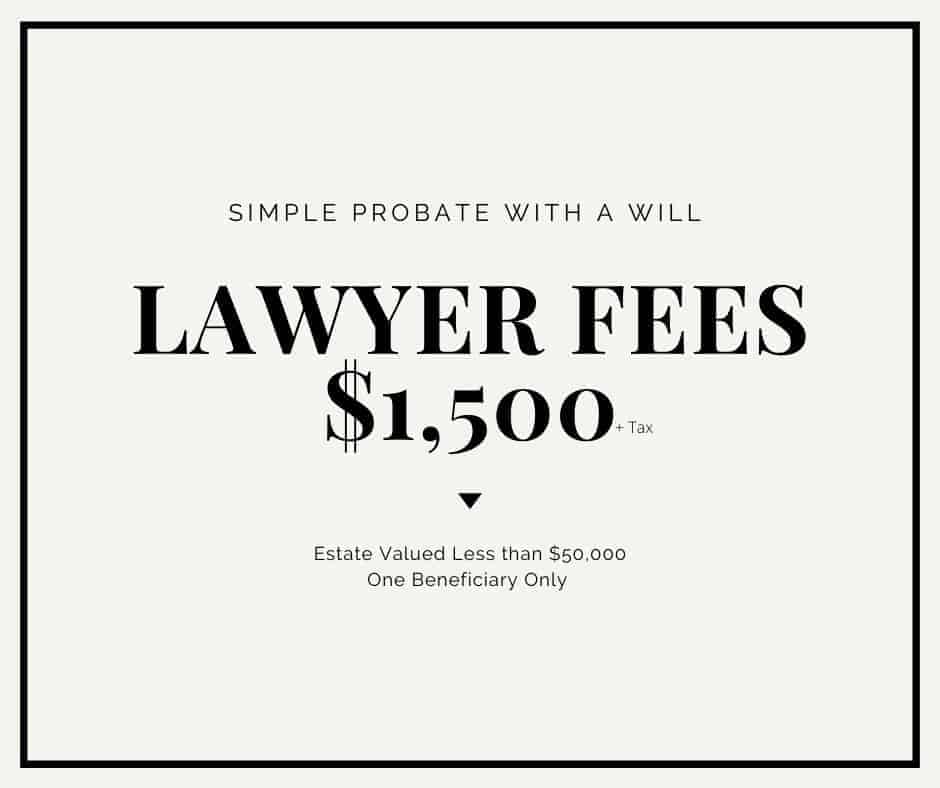
Our Estate Lawyer Fees for small & simple estate valued less than $50,000/- with one beneficiary only, Legal fees, is $1,500.00 +Tax
What is Included in the Probate Legal fees, and when to select this package
NOT INCLUDED IN LEGAL FEES;
Our Estate Lawyer Fees for small & simple estate valued more than $50,000/- with one beneficiary only, Legal Fees is $1,800.00 +Tax
What is Included in the Probate Legal Fees and when to select this package
NOT INCLUDED IN LEGAL FEES;
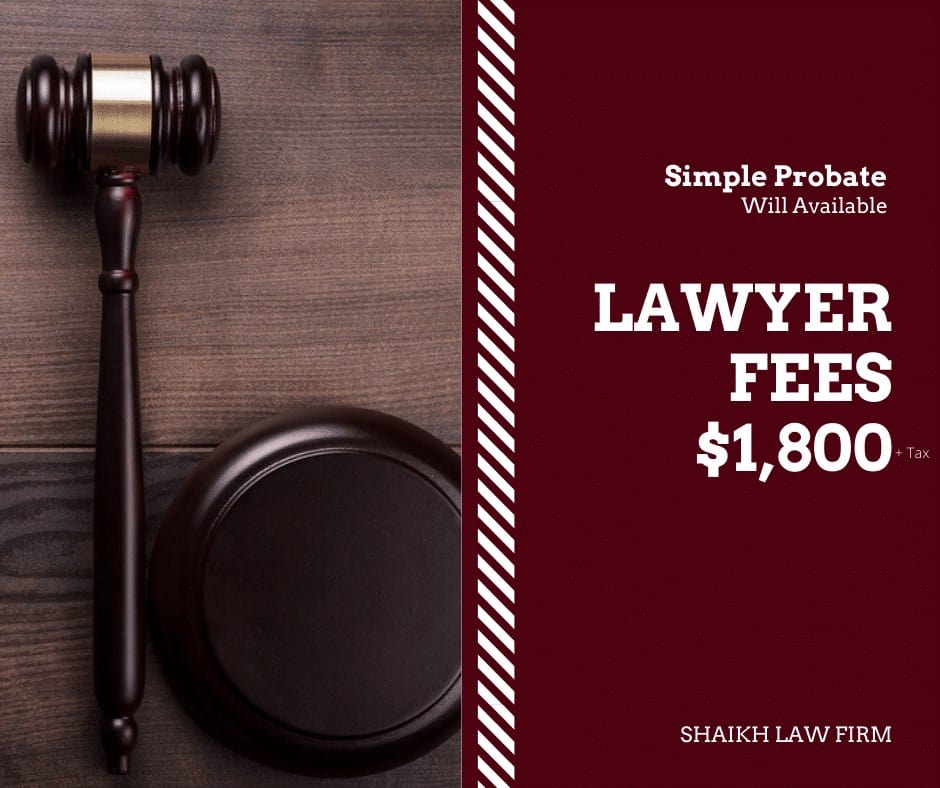
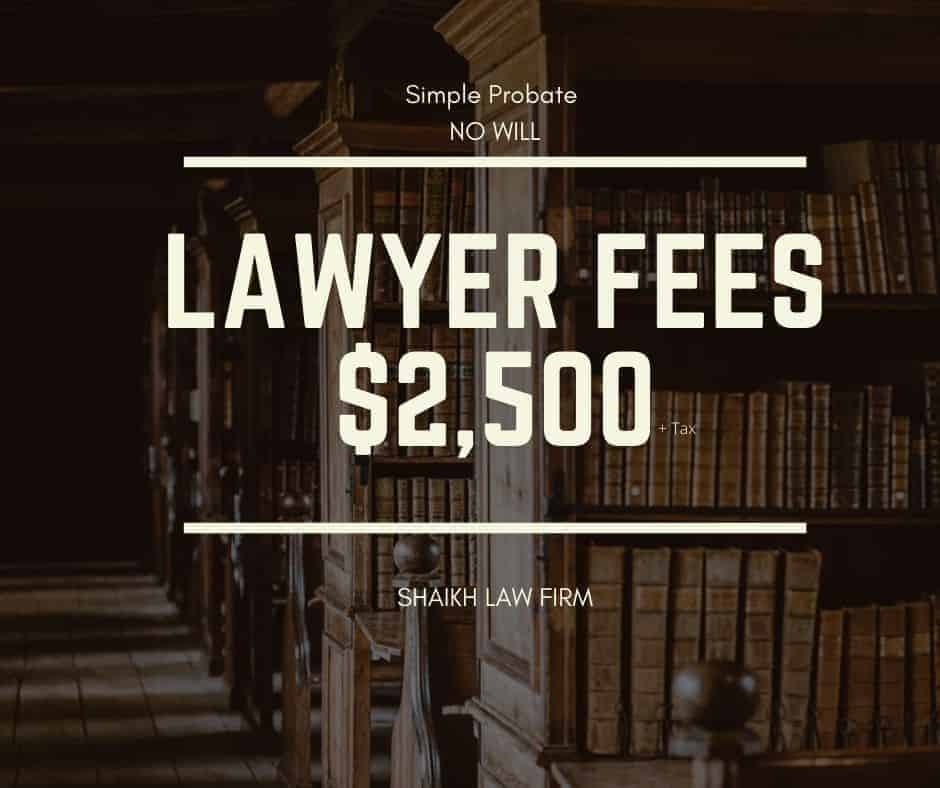
Our Estate Lawyer Fees for a probate application is $2,500.00 +Tax if a Will is not present
What is Included in the Probate Legal Fees and when to select this package
NOT INCLUDED IN LEGAL FEES;
It is common for a probate application to become complicated and highly contentious among beneficiaries. Estate litigation can get complicated not only because of complex legal principles and rules but also due to emotions and family relationships. You want to make sure you retain an Estate Litigation lawyer who can help you navigate through the process efficiently and effectively.
Our Probate Lawyer can help you with the following areas of estate litigation:
An hourly legal fee applies for a contested probate application. However, depending on the matter’s complexity, we can offer block fees retainer to our clients. Please contact us to set up a free 15-minute consultation.
Get Free 15 Minutes Phone Consultation
What is an estate?
A person’s estate is the collection of their possessions, real estate, bank accounts, and other assets and liabilities that they may leave behind upon passing.
What is probate in Ontario?
Probate is a legal process where the court formally validates the deceased’s Last Will and confirms the executor’s authority as the estate trustee to distribute the deceased’s assets, such as real estate, bank accounts, and financial investments. If there is no Will, then by way of probate, the court appoints an estate trustee to distribute the deceased’s assets to the beneficiaries or legal heirs.
Is the principal residence subject to probate in Ontario?
Yes, probate fees are applicable to a principal residence in Ontario if it is solely owned by the deceased or held as a tenant in common. However, if the property is owned in joint tenancy with a right of survivorship, it bypasses probate and is not subject to these fees.
Who pays probate fees in Ontario?
Probate fees in Ontario are paid from the assets of the deceased’s estate. The executor of the estate typically uses estate funds, such as money from bank accounts, to cover these costs. These fees are not the responsibility of the personal representatives, executors, or beneficiaries directly, but are instead deducted from the estate before distribution.
Estate Assets—What Must Be Included?
The deceased’s estate that is subject to probate includes all owned assets:
Exclusions
For EAT purposes, the following assets do not need to be declared on an EAT return:
How to Pay Probate Fees in Ontario or EAT
In Ontario, probate fees, also known as Estate Administration Tax (EAT), must be paid by certified cheque or money order made payable to the Minister of Finance. Payment is submitted together with the probate application when filing with the court.
Executors should ensure sufficient estate funds are available to cover this cost before submission. In cases where EAT amounts are significant, and there are insufficient liquid assets, funds may need to be sourced from the deceased’s other assets. Estate representatives may arrange for advances or loans, or request deferrals under specific conditions with the help of an estate lawyer.
Filing the Estate Administration Tax Return
Starting January 1, 2020, the estate representative must file an Estate Information Return within 180 days of receiving the Certificate of Appointment of Estate Trustee. This deadline extends to the next business day if it falls on a weekend or holiday.
Exemptions from Filing
An Estate Information Return is not required if any of the following certificates are issued:
How to File the Return
The return can be filed online, by mail, or in person at the Ministry of Finance, Compliance Branch, 33 King Street West, PO Box 625, Oshawa, ON, L1H 8H9, or by fax to 1-866-888-3850. It is crucial that each estate representative signs the return, attesting to the accuracy and completeness of the information provided.
Updates, Estimates, and Refunds
Estimates are used when asset values are not precisely known at the time of probate. The estate trustee must update the EAT application and pay any additional EAT as soon as the asset values are firmly established. Overpayments of EAT are difficult to recover, emphasizing the importance of accurate initial assessments.
